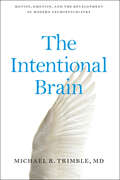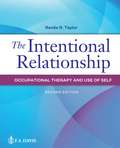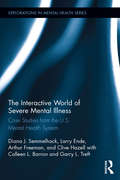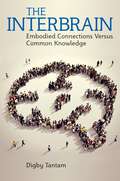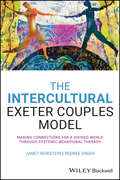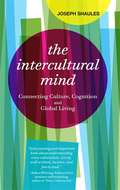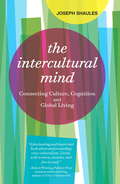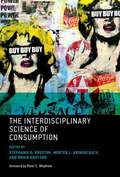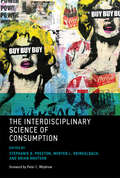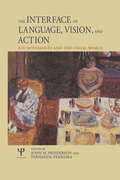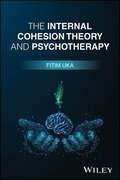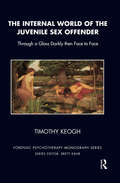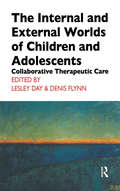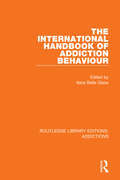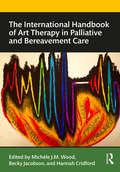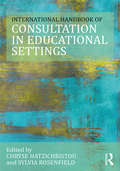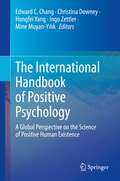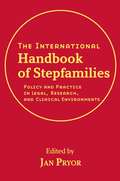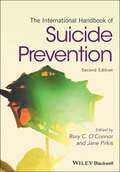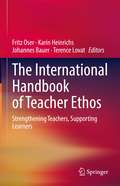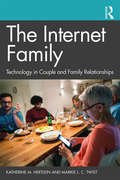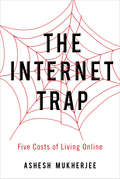- Table View
- List View
The Intentional Brain: Motion, Emotion, And The Development Of Modern Neuropsychiatry
by Michael R. Trimble“A tour de force: an assessment of the ‘culture’ of mind–brain relations beginning with the ancients and ending in the present.” —Edward Shorter, PhD, National Book Award finalist and author of A History of PsychiatryNeuropsychiatry has a distinguished history, yet its ideals and principles fell out of fashion in the early twentieth century as neurology and psychiatry diverged into separate disciplines. Later, neuropsychiatry reemerged as the two disciplines moved closer again, accelerated by advances in neuroanatomy, neurochemistry, and drugs that alter the functioning of the central nervous system. But as neuropsychiatrist Michael R. Trimble explains in The Intentional Brain, the new neuropsychiatry has its own identity and is more than simply a borderland between two disparate clinical disciplines.Looking at neuropsychiatry in the context of major cultural and artistic achievements, Trimble explores changing views of the human brain and its relation to behavior and cognition over 2,500 years of Western civilization. Beginning with the early Greek physicians and moving through the Middle Ages, Enlightenment, Romantic era, World Wars, and present day, he explores understandings about the brain’s integral role in determining movement, motivation, and mood. Persuasively arguing that storytelling forms the backbone of human culture and individuality, Trimble describes the dawn and development of artistic creativity and traces the conflicts between differing philosophical views of our world and our position in it.A sweeping history of the branch of medicine concerned with both psychic and organic aspects of mental disorder, the book reveals what scientists have learned about movement and emotion by studying people with such diseases as epilepsy, syphilis, hysteria, psychosis, movement disorders, and melancholia. The Intentional Brain is a marvelous and interdisciplinary look at the clinical interface between the mind and the brain.
The Intentional Brain: Motion, Emotion, and the Development of Modern Neuropsychiatry
by Michael R. TrimbleA magnificent examination of the clinical interface between the mind and the brain.Neuropsychiatry has a distinguished history, yet its ideals and principles fell out of fashion in the early twentieth century as neurology and psychiatry diverged into separate disciplines. Later, neuropsychiatry reemerged as the two disciplines moved closer again, accelerated by advances in neuroanatomy, neurochemistry, and drugs that alter the functioning of the central nervous system. But as neuropsychiatrist Michael R. Trimble explains in The Intentional Brain, the new neuropsychiatry has its own identity and is more than simply a borderland between two disparate clinical disciplines.Looking at neuropsychiatry in the context of major cultural and artistic achievements, Trimble explores changing views of the human brain and its relation to behavior and cognition over 2,500 years of Western civilization. Beginning with the early Greek physicians and moving through the Middle Ages, the Enlightenment, the romantic era, the World Wars, and up to the present day, he explores understandings about the brain’s integral role in determining movement, motivation, and mood. Persuasively arguing that storytelling forms the backbone of human culture and individuality, Trimble describes the dawn and development of artistic creativity and traces the conflicts between differing philosophical views of our world and our position in it.A sweeping history of the branch of medicine concerned with both psychic and organic aspects of mental disorder, the book reveals what scientists have learned about movement and emotion by studying people with such diseases as epilepsy, syphilis, hysteria, psychosis, movement disorders, and melancholia. The Intentional Brain is a marvelous and interdisciplinary look at the clinical interface between the mind and the brain.
The Intentional Relationship: Occupational Therapy And Use Of Self
by Renee R. TaylorThis groundbreaking book addresses a critical aspect of the occupational therapy practice—the art and science of building effective therapeutic relationships with clients. A distinguished clinician, scientist, and educator, Renée Taylor, PhD, has defined a conceptual practice model, the Intentional Relationship Model, to identify how the client and the therapist each contribute to the unique interpersonal dynamic that becomes the therapeutic relationship. She emphasizes how therapists must act deliberately, thoughtfully, and with vigilant anticipation of the challenges and breakthroughs that have the potential to influence the course of the relationship.
The Interactive World of Severe Mental Illness: Case Studies of the U.S. Mental Health System (Explorations in Mental Health)
by Arthur Freeman Clive Hazell Diana J. Semmelhack Larry Ende Colleen L. Barron Garry L. TreftIn our society, medication is often seen as the treatment for severe mental illness, with psychotherapy a secondary treatment. However, quality social interaction may be as important for the recovery of those with severe mental illness as are treatments. This volume makes this point while describing the emotionally moving lives of eight individuals with severe mental illness as they exist in the U.S. mental health system. Offering social and psychological insight into their experiences, these stories demonstrate how patients can create meaningful lives in the face of great difficulties. Based on in-depth interviews with clients with severe mental illness, this volume explores which structures of interaction encourage growth for people with severe mental illness, and which trigger psychological damage. It considers the clients’ relationships with friends, family, peers, spouses, lovers, co-workers, mental health professionals, institutions, the community, and the society as a whole. It focuses specifically on how structures of social interaction can promote or harm psychological growth, and how interaction dynamics affect the psychological well-being of individuals with severe mental illness.
The Interbrain: Embodied Connections Versus Common Knowledge
by Digby TantamDigby Tantam presents his ground-breaking theory of the interbrain, the idea that human beings are endlessly connected by a continuous interplay of non-verbal communication of which we are unaware. Considering social smiles and the way emotions can spread from one person to another, he explores the research that shows how our brains are linked and draws out the implications of the interbrain for our understanding of empathy, social communication, psychology and group behaviour. Exploring this often overlooked aspect of our human nature, Tantam demonstrates how the interbrain has huge significance for psychology, psychiatry and sociology and can transform our understanding of war, morality, terrorism, psychopathy and much more.
The Intercultural Exeter Couples Model: Making Connections for a Divided World Through Systemic-Behavioral Therapy
by Janet Reibstein Reenee SinghIncrease the efficacy of your treatment interventions in intercultural couples therapy The Intercultural Exeter Couples Model: Making Connections for a Divided World Through Systemic-Behavioral Therapy provides practitioners with a thorough guide to effectively treating intercultural couples. The book consists of a systematic effort to translate systemic ideas that take into account a cultural perspective into a highly useable and practical form. The Intercultural Exeter Couples Model also attempts to marry two, often distinct, forms of practice: the systemic and the behavioral. Both approaches have much to contribute to effective couples’ counselling but they are often theoretically siloed. This book demonstrates the value of using both approaches simultaneously. This book provides concrete and practical strategies for implementing systemic and behavioral approaches to intercultural couples’ therapy in a manner consistent with clinical best practice. Rather than ignoring the significant and complex impacts that differing cultures can have on a relationship, The Intercultural Exeter Couple Model puts those differences front and center, encouraging the therapist to engage with the cultural mismatch that can be at the core of many couples’ ongoing friction. The book’s chapters tackle both the model itself and a variety of interventions, covering topics including: Teaching couples how to break patterns and prepare them to establish new ones Training couples to communicate effectively Establishing new modes of behavior in couples An explanation of empathic bridging maneuvers A description of the use of life-space explorations Perfect for clinicians, students, and professors interested in or practicing in the field of couples’ therapy, The Intercultural Exeter Couples Model provides readers with an in-depth exploration of an increasingly important model of couples therapy and describes, in painstaking detail, the interventions necessary to achieve positive patient outcomes.
The Intercultural Mind: Connecting Culture, Cognition And Global Living
by Joseph ShaulesIn this pioneering book, Joseph Shaules explores exciting new research in cultural psychology and neuroscience, and explains how the new science of the mind can help us understand how the unconscious mind processes cultural differences, and how our sense of identity shapes how we view the world.The Intercultural Mind presents new perspectives on important questions such as:What is culture shock, and how does it affect us?Why are we blind to our own cultural conditioning?Can cultural differences be measured?What does it mean to have an international mindset?Illustrated with a wealth of examples and memorable stories, The Intercultural Mind is a fascinating look at how intercultural experiences can transform the geography of thinking.
The Intercultural Mind: Connecting Culture, Cognition, and Global Living
by Joseph ShaulesIn this pioneering book, Joseph Shaules presents exciting new research from cultural psychology and neuroscience. It sheds light on the hidden influence of culture on the unconscious mind, and helps people get more out of their intercultural journeys.The Intercultural Mind presents new perspectives on important questions such as: What is culture shock, and how does it affect us? Why are we blind to our own cultural conditioning? Can cultural differences be measured? What does it mean to have an international mindset? Illustrated with a wealth of examples and memorable stories, The Intercultural Mind is a fascinating look at how intercultural experiences can transform the geography of our minds.
The Interdisciplinary Science of Consumption
by Peter C. Whybrow Stephanie D. Preston Morten L. Kringelbach Brian KnutsonOur drive to consume -- our desire for food, clothing, smart phones, and megahomes -- evolved from our ancestors' drive to survive. But the psychological and neural processes that originally evolved to guide mammals toward resources that are necessary but scarce may mislead us in modern conditions of material abundance. Such phenomena as obesity, financial bubbles, hoarding, and shopping sprees suggest a mismatch between our instinct to consume and our current environment. This volume brings together research from psychology, neuroscience, economics, marketing, animal behavior, and evolution to explore the causes and consequences of consumption. Contributors consider such topics as how animal food-storing informs human consumption; the downside of evolved "fast and frugal" rules for eating; how future discounting and the draw toward immediate rewards influence food consumption, addiction, and our ability to save; overconsumption as social display; and the policy implications of consumption science.Taken together, the chapters make the case for an emerging interdisciplinary science of consumption that reflects commonalities across species, domains, and fields of inquiry. By carefully comparing mechanisms that underlie seemingly disparate outcomes, we can achieve a unified understanding of consumption that could benefit both science and society.
The Interdisciplinary Science of Consumption (The\mit Press Ser.)
by Stephanie D. Preston Morten L. Kringelbach Brian KnutsonScholars from psychology, neuroscience, economics, animal behavior, and evolution describe the latest research on the causes and consequences of overconsumption.Our drive to consume—our desire for food, clothing, smart phones, and megahomes—evolved from our ancestors' drive to survive. But the psychological and neural processes that originally evolved to guide mammals toward resources that are necessary but scarce may mislead us in modern conditions of material abundance. Such phenomena as obesity, financial bubbles, hoarding, and shopping sprees suggest a mismatch between our instinct to consume and our current environment. This volume brings together research from psychology, neuroscience, economics, marketing, animal behavior, and evolution to explore the causes and consequences of consumption. Contributors consider such topics as how animal food-storing informs human consumption; the downside of evolved “fast and frugal” rules for eating; how future discounting and the draw toward immediate rewards influence food consumption, addiction, and our ability to save; overconsumption as social display; and the policy implications of consumption science.Taken together, the chapters make the case for an emerging interdisciplinary science of consumption that reflects commonalities across species, domains, and fields of inquiry. By carefully comparing mechanisms that underlie seemingly disparate outcomes, we can achieve a unified understanding of consumption that could benefit both science and society.
The Interface of Language, Vision, and Action: Eye Movements and the Visual World
by John Henderson Fernanda FerreiraThis book brings together chapters from investigators on the leading edge on this new research area to explore on the leading edge on this new research area to explore common theoretical issues, empirical findings, technical problems, and outstanding questions. This book will serve as a blueprint for work on the interface of vision, language, and action over the next five to ten years.
The Internal Cohesion Theory and Psychotherapy
by Fitim UkaA novel integrative approach to psychotherapy targeting various aspects of human functioning across temporal dimensions The Internal Cohesion Theory and Psychotherapy offers a novel approach to understanding human psychological experiences and fostering internal cohesion to maintain optimal mental health or prevent the development of psycho-emotional and psycho-social disorders. In this groundbreaking book, renowned scholar in psychotherapy research, policy, and practice Dr. Fitim Uka presents a holistic framework—Internal Cohesion Psychotherapy (ICP)—to help practitioners reshape their clients’ connections with their past, present, and future experiences. Rooted in Internal Cohesion Theory, ICP integrates evidence-based knowledge in the fields of psychology and psychotherapy, seeking to harmonize the intrapersonal, interpersonal, professional, and spiritual to create positive change in people’s lives and support well-being. Dr. Uka provides step-by-step guidance on developing efficient and effective treatment plans in a variety of treatment environments while demonstrating how appreciating the complexity of the therapeutic relationship can minimize the impact of adversity on clients. Featuring a wealth of real-world insights and concise guidelines for practitioners wanting to implement ICP in their practice, The Internal Cohesion Theory and Psychotherapy an indispensable resource for all clinicians, researchers, social workers, therapists, psychologists, and policymakers devoted to improving individual and collective mental health worldwide.
The Internal World and Attachment: Theoretical And Empirical Perspectives
by Geoff GoodmanHow, asks Geoff Goodman in The Internal World and Attachment, can we progress further in integrating the fruits of attachment research with the accumulated clinical wisdom of psychoanalytic theorizing about the internal world of object representations? The key, he answers, is to look more closely at the basic assumptions of each body of theory, especially those assumptions, whether embedded or explicit, that bear on the formation of psychic structure. Drawing on Kernberg's insights into the affective and instinctual substrata of psychic organizations, Goodman proposes that insecure attachment categories can be correlated with particular constellations of self and object representations. Such convergences provide a springboard to further theoretical explanations, most especially to the relations between attachment and adult sexual behavior. Indeed, one outstanding feature of Goodman's proposals is the light they cast on various forms and meanings of sexual psychopathology, as he delineates how both promiscuity and retreats from sexual intimacy can be differentially interpreted depending on the patient's pattern of attachment. Destined to provoke lively debate, The Internal World and Attachment is a powerfully informative attempt to go beyond the researcher's view of attachment as a motivational system. For Goodman, attachment is informed by an internal logic that reflects fantasies and defense, and an appreciation of the interaction of attachment pattern with various constellations of self and object representations can deepen our understanding of the internal world in clinically consequential ways. Keeping his eye resolutely on the clinical texture of attachment observations and the clinical phenomenology expressive of internal object relations, Goodman provides the reader with an experience-near basis for viewing two influential bodies of knowledge as complementary avenues for apprehending the internal meaning of externally observable behavior.
The Internal World of the Juvenile Sex Offender: Through a Glass Darkly then Face to Face (The Forensic Psychotherapy Monograph Series)
by Timothy KeoghThe book argues the case for the usefulness of an empirically based understanding of the internal world of juvenile sex offenders as a way of humanely relating to their difficulties. It details the extent and nature of juvenile sex offending and its impact on victims and provides an extensive psychoanalytically oriented description of this offender group. The background of these offenders is examined, focusing on their experience of abuse, especially sexual abuse. Attention is paid to the unique characteristics of these offenders, particularly their attachment difficulties. The value of attachment theory and the concepts of psychopathy and malignant narcissism are then explored as a means of viewing their internal world. This internal world is also viewed through an empirical lens, which reveals them to have impaired psychic representations of human relationship, different needs for relationship and, in the most psychopathic group, an obfuscation of that need. The implications of these findings are then considered and the application of these understandings of their internal world is then explored.
The Internal and External Worlds of Children and Adolescents: Collaborative Therapeutic Care (The\cassel Hospital Monograph Ser.)
by Deirdre Dowling Lesley Day Lee Marsden Denis Flynn Paul Coombe Kevin Healy Lisa Morice Steve McCluskey Joanne TurnerThe field of child and adolescent psychotherapy is still relatively young and its short history has resulted in a paucity of mental health services for this neglected group. There is a distinct lack of research, evidence and treatment facilities, and yet in order to produce mentally healthy, undamaged adults of the future, this must surely be one area to concentrate resources on. The Cassel Hospital, and this book in particular, seek to redress the balance, and consequently, the chapters in this book follow a diverse path, on subjects ranging from Munchhausen Syndrome by proxy, to abuse within the home, relations within families and borderline adolescents. Various clinical cases are described in this much-needed volume that invites the reader to experience and learn from the life in a hospital that is often seen as the "last resort" of treatment for many children and adolescents. The Internal and External Worlds of Children and Adolescents provides a thoughtful perspective on mental health services for one of the most neglected groups in society - our children and adolescents.
The International African Library: After Rape
by Holly PorterFollowing the ICC intervention in 2005, northern Uganda has been at the heart of international justice debates. The emergent controversy, however, missed crucial aspects of Acholi realities: that the primary moral imperative in the wake of wrongdoing was not punishment but, instead, the restoration of social harmony. Drawing upon abundant fieldwork and in-depth interviews with almost 200 women, Holly Porter examines issues surrounding wrongdoing and justice, and sexual violence and rape, among the Acholi people in northern Uganda. This intricate exploration offers evidence of a more complicated and nuanced explanation of rape and its aftermath, suggesting a re-imagining of the meanings of post-atrocity justice, whilst acknowledging the role of sex, power and politics in all sexual experiences between coercion and consent. With its wide investigation of social life in northern Uganda, this provocative study offers vital analysis for those interested in sexual and gender violence, post-conflict reconstruction and human rights.
The International Handbook of Addiction Behaviour (Routledge Library Editions: Addictions #1)
by Ilana Belle GlassInternational in its scope and multidisciplinary in its approach, The International Handbook of Addiction Behaviour, originally published in 1991, set a new agenda in the addictions field. This volume brings together the full variety of scientific approaches to addiction behaviour. It broke new ground by highlighting the links between clinical work, training and research and proposes a way forward towards integrated treatment interventions. This title is a definitive teaching text and will still be a valuable resource for students in the addiction field.
The International Handbook of Art Therapy in Palliative and Bereavement Care (Routledge International Handbooks)
by Hannah Cridford Michèle J.M. Wood Becky JacobsonThe International Handbook of Art Therapy in Palliative and Bereavement Care offers a multicultural and international perspective on how art therapy can be of help to individuals, groups, families, communities, and nations facing death and dying as well as grief and loss. Over 50 art therapists from around the world write about the transforming power of art therapy in the lives of those facing terminal illness, dementia, loss, and grief. They offer practical descriptions and techniques for working with adults and children to guide professionals, including those new to using art therapy and creative approaches in end-of-life care services. This international handbook is essential reading for arts therapists, social workers, medical personnel, faith leaders, and psychologists interested in a collaborative and accessible approach to working with patients and families affected by loss.
The International Handbook of Consultation in Educational Settings (Consultation, Supervision, and Professional Learning in School Psychology Series)
by Sylvia Rosenfield Chryse HatzichristouThe rapid changes in the composition of school-age youth around the world have catalyzed a growing concern about how to address children’s mental health and education. Grounded in this increasingly global perspective, The International Handbook of Consultation in Educational Settings is designed to provide a multicultural/transnational approach to consultation theory, research, training, and practice in educational settings. With chapters written by geographically diverse and prominent scholars across the field of school psychology, this handbook captures the range of ways in which consultation services are trained, implemented, and researched internationally. Written for practitioners, researchers, faculty members, and graduate students in the fields of school psychology, school counseling, special education, and educational psychology, this volume is the first of its kind to provide a comprehensive look at consultation in learning environments across the world. The International Handbook of Consultation in Educational Settings offers various perspectives on models, implementation, training, and research on school consultation. After an introduction to the volume by the editors, contributors to Part II examine school-based consultation around the world to explore how consultation services are implemented in different countries. Part III addresses cross-cultural issues in consultation, particularly at a systems level. Part IV presents themes related to processes and issues in the implementation of consultation by focusing on approaches in various countries. The chapters in Part V focus on consultation training, offering insights into the development of students and professionals into effective consultants in cross-cultural and systemic contexts. Part VI describes how practitioners can contribute to the body of research on consultation through careful planning and implementation of their work. Finally, the editors summarize key concepts and findings in a concluding chapter.
The International Handbook of Positive Psychology: A Global Perspective on the Science of Positive Human Existence
by Edward C. Chang Christina Downey Hongfei Yang Ingo Zettler Mine Muyan-YılıkThis handbook discusses the latest findings from different fields of positive psychology from a global perspective by providing a coherent framework to get a better understanding of the development and practice of positive psychology. It starts with the parameters of positive psychology and a summary of the historical rise of positive psychology (both first wave and second wave of positive psychology) in the US, and its slow but steady growth on a global scale. This handbook highlights the major contributions of positive psychologists across 17 major regions of the world on theory, research, assessment and Practice. It discusses how positive psychology can progress human living in different countries and it shows the reasons why positive psychology has become an important source in research and education around the world.
The International Handbook of Stepfamilies
by Jan PryorWritten by contributors from around the world, The International Handbook of Stepfamilies: Policy and Practice in Legal, Research, and Clinical Environments is a collection of research, legal, and clinical recommendations that fills a growing need for complex, re-formed families. Using the information in this book, which includes contemporary research and its implications, you will be able to consider stepfamilies in an international context. Understand the issues that clinicians face when they work with stepfamilies, both before and after formation, and gain more knowledge about this topic as the rates of family reformation increase.
The International Handbook of Suicide Prevention
by Rory C. O’Connor Jane PirkisThe International Handbook of Suicide Prevention, 2nd Edition, presents a series of readings that consider the individual and societal factors that lead to suicide, it addresses ways these factors may be mitigated, and presents the most up-to-date evidence for effective suicide prevention approaches. An updated reference that shows why effective suicide prevention can only be achieved by understanding the many reasons why people choose to end their lives Gathers together contributions from more than 100 of the world’s leading authorities on suicidal behavior—many of them new to this edition Considers suicide from epidemiological, psychological, clinical, sociological, and neurobiological perspectives, providing a holistic understanding of the subject Describes the most up-to-date, evidence-based research and practice from across the globe, and explores its implications across countries, cultures, and the lifespan
The International Handbook of Teacher Ethos: Strengthening Teachers, Supporting Learners
by Terence Lovat Johannes Bauer Fritz Oser Karin HeinrichsThis volume is the first handbook that brings together cutting-edge international research on teacher ethos from a broad array of disciplines. The main focus will be on research that illustrates current conceptualizations of ethos and its importance for acting effectively and responsibly in and out of the classroom. Research will encompass updated empirical and philosophical work that points to the difference in learning when teaching is practised as a moral activity instead of a merely functional one. Authors are among the world’s foremost researchers whose work crosses over from moral education into psychology, neuroscience, sociology, philosophy, pedagogy, and curriculum, drawing on these various fields of research. Today, more than ever, we understand that teachers, like other professionals, need more than subject-matter expertise for acting responsibly and doing their best in their daily duties. Doing so requires possessing a guiding system of professional ethics, moral positioning, goals, norms, and values – in other words: a professional ethos. While the handbook concentrates on Western domains in the current era, the work will extend to other cultures and times as well. With this comprehensive range of perspectives, the book will be attractive and useful for researchers on teachers and teaching as well as for teacher educators, curriculum designers, educational officials, and, last-but-not-least, anyone who is interested in what makes a good teacher. This volume is also a tribute to Fritz Oser, a leading scholar in research on ethos, who sadly passed-away during the compilation of this handbook.
The Internet Family: Technology in Couple and Family Relationships
by Katherine M. Hertlein Markie L. TwistIn The Internet Family, Drs. Katherine Hertlein and Markie Twist provide a current and comprehensive look at the effects of technology on couple and family relationships. Beginning with an overview of the multifaceted ways in which technology impacts our relationships today, the authors discuss a wide range of topics pertinent to couple and family life. Chapters focus on issues such as online dating and infidelity, parenting and the Internet, video gaming, cyberbullying, and everyday usage of social and new media, before providing guidance on how the reader can successfully navigate the advantages and risks that emerge from the use of specific technologies. An online appendix offers a range of assessments and practical tools for identifying Internet-related problems and solutions. A portion of the text is also devoted to the application of the Couple and Family Technology framework and how it can be effectively integrated into clinicians’ current practice. Couple and family therapists will find this book highly informative, both to use in their own practice and for referring clients to as part of the treatment process.
The Internet Trap: Five Costs of Living Online
by Ashesh MukherjeeWhether we are checking emails, following friends on Facebook and Twitter, catching up on gossip from TMZ, planning holidays on TripAdvisor, arranging dates on Match.com, watching videos on Youtube, or simply browsing for deals on Amazon, the internet pervades our professional and personal environments. The internet has revolutionized our lives, but at what cost?In The Internet Trap, Ashesh Mukherjee uses the latest research in consumer psychology to highlight five hidden costs of living online: too many temptations, too much information, too much customization, too many comparisons, and too little privacy. The book uses everyday examples to explain these costs including how surfing the internet anonymously can encourage bad behavior, using social media can make us envious and unhappy, and doing online research can devalue the product finally chosen. The book also provides actionable solutions to minimize these costs. For example, the book reveals how deciding not to choose is as important as deciding what to choose, setting up structural barriers to temptation can reduce overspending on e-commerce websites, and comparisons with others on social media websites needs to be cold rather than hot. The Internet Trap provides a new perspective on the dark side of the internet, and gives readers the tools to become smarter users of the internet.
